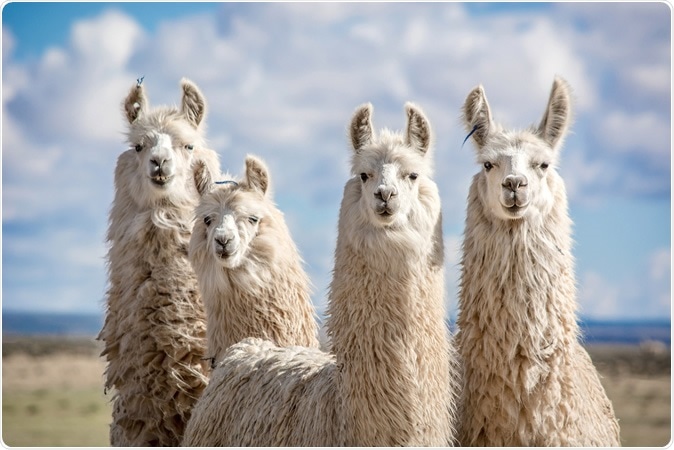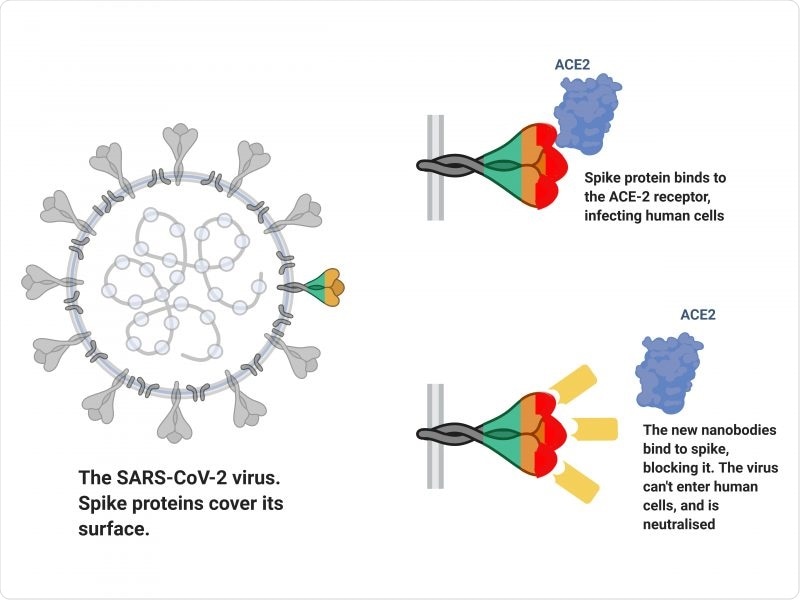The coronavirus disease (COVID-19), caused by the severe acute respiratory syndrome coronavirus 2 (SARS-CoV-2), is actively spreading across the globe, infecting more than 13.25 million people.
Their research suggests that antibodies from llamas may provide immune-boosting therapy, which can help combat the ongoing coronavirus pandemic. The team used Fifi the llama's specially evolved antibodies to generate immune-boosting therapy. Fifi is a 10-year-old llama that's helping with experiments.
Llamas were chosen as they produce nanobodies, tiny antibodies which can be used in a clinical environment. The researchers used these nanobodies as they stick to the spike protein of the SARS-CoV-2.

Image Credit: Noe Besso
Neutralizing effect
Llamas, camels, and alpacas naturally produce amounts of small antibodies and turn them into nanobodies. In the study, published in the Nature Structural and Molecular Biology, the team engineered the new nanobodies by using a collection of antibodies from llama blood cells. They found that the nanobodies were able to bind effectively to the spike protein of the novel coronavirus, blocking it from entering human cells through the angiotensin-converting enzyme 2 (ACE2), hence, and therefore blocking viral replication.
"This work establishes that nanobody maturation technology can be deployed to produce a highly neutralizing agent against an emerging viral threat in real-time. The approach may be useful in identifying complementary epitopes to those identified by animal immunization approaches," the researchers wrote in the paper.
"The H11-H4 and H11-D4 nanobodies may find application in a cocktail of laboratory-synthesized neutralizing antibodies given for passive immunization of severely ill COVID-19 patients," they added.
Future therapy
The team hopes that the experimental treatment could be used in a similar way to convalescent serum, which involves using the plasma containing antibodies from people who recovered from the coronavirus and transfuse it to those who are severely sick in the hopes they can have an immune boost to fight the infection. Convalescent plasma has been used to improve clinical outcomes by way of a process called passive immunization.
"These nanobodies have the potential to be used in a similar way to convalescent serum, effectively stopping the progression of the virus in patients who are ill. We were able to combine one of the nanobodies with a human antibody and show the combination was even more powerful than either alone," James Naismith, Director of the Rosalind Franklin Institute, said.
The team has currently started screening antibodies from Fifi taken after she was immunized with harmless purified virus proteins. The team is evaluating the preliminary findings, showing the llama's immune system produced different antibodies from those already identified, which can provide many nanobodies to be tested against the virus.
Though the findings are promising, further research and evaluation are still needed.

What are the antibodies?
Antibodies are part of the body's adaptive immune system. They are Y-shaped molecules that fight off infection by responding to invading viruses or bacteria by neutralizing them. After being exposed to a foreign substance, called an antigen, antibodies continue to circulate in the blood, protecting against future exposure to the specific pathogen.
It prevents future infection, and immune therapy can help boost a sick person's immune therapy with antibodies that have already morphed to neutralize the virus.
The promising results may pave the way for therapies that can help patients stricken by the novel coronavirus to fight the infection, which can cause severe illness in vulnerable people. These include the elderly and those with underlying health conditions and immune system disorders.
COVID-19 global toll
The coronavirus pandemic has now affected 188 countries and territories worldwide, with the United States as the country with the highest number of infections. It has reported more than 3.41 million confirmed cases and more than 136,000 deaths.
Brazil has also reported skyrocketing cases over the past weeks, reaching a staggering 1.92 million cases and more than 74,000 deaths. South American is now one of the hardest-hit regions of the pandemic, with Brazil, Peru, and Chile reporting high infection rates. Peru has more than 333,000 confirmed cases, while Chile has reported at least 319,000 cases.
Other studies on immune therapy
In addition to this new research, other studies hint at the efficacy of nanobodies in neutralizing the SARS-CoV-2.
In China, a team of researchers at the Chinese Academy of Sciences report the efficacy of synthetic nanobodies in neutralizing the novel coronavirus pseudorviruses, which are synthetic viruses used to inject genetic material into bacterial and eukaryotic cells. These synthetic nanobodies show potential in the development of therapies to combat COVID-19.
In another study, a team of international scientists reported that two copies of a type of antibody produced by llamas could make a new antibody that can combat the coronavirus pandemic. The fragment found in a llama antibody can effectively bind to the proteins of the virus and neutralize it, akin to the effects of the other studies.
Lastly, a study showcased two copies of a special kind of antibody produced by llamas that can be used to make a novel antibody that binds tightly to a vital protein of the SARS-CoV-2, blocking infection.
All these studies point to one thing, nanobodies from llamas can potentially help in the development of therapies to fight infection with the SARS-CoV-2, and battle the current health crisis that has spread across the globe.
Sources:
Journal reference: